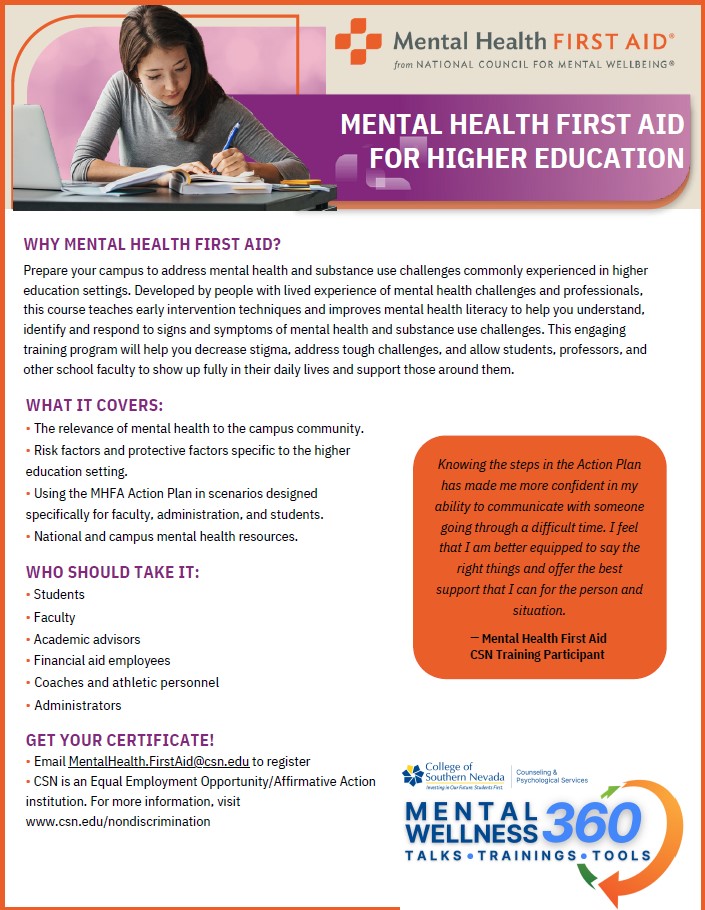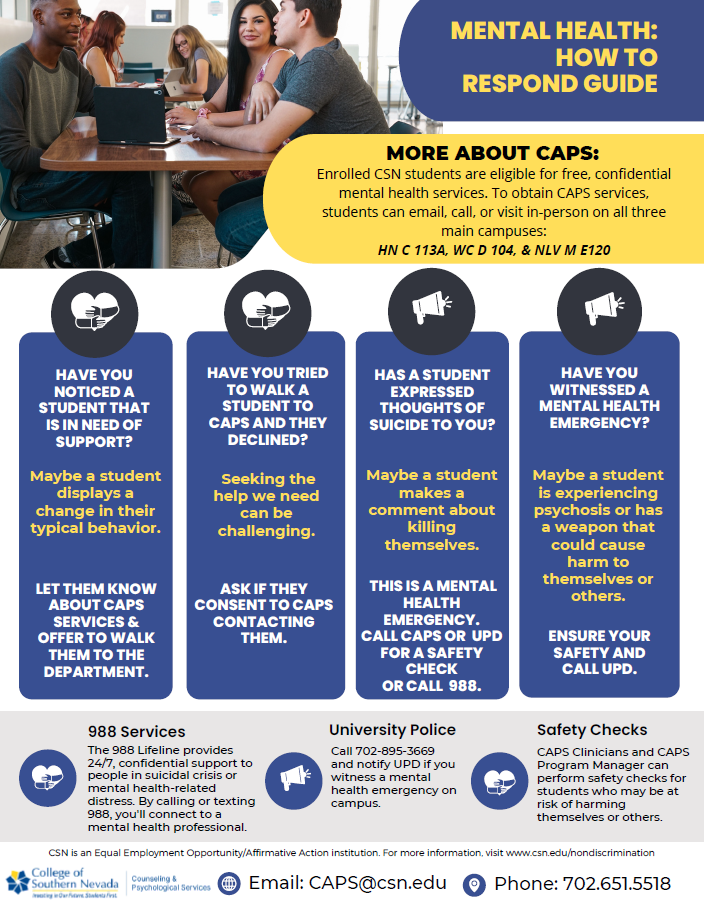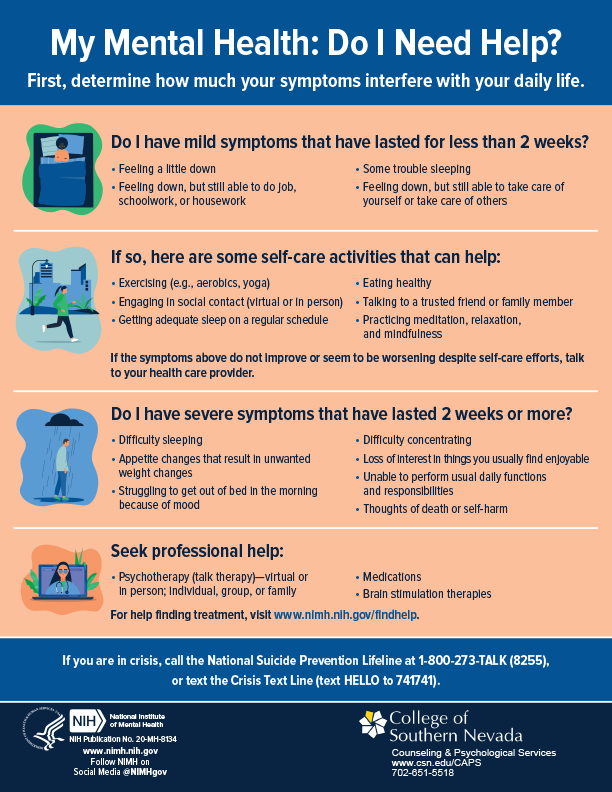According to the National Alliance on Mental Illness (NAMI), 1 in 5 students experience a mental health condition in college and half of college students reported their mental health as below average or poor. Common mental health stressors for college students include anxiety over grades and finances, and burnout. Students often find that such issues impact their ability to succeed in college.
Counseling and Psychological Services (CAPS) strives to help students pursue their academic, personal, and career goals by promoting self-advocacy, self-regulation, and developing coping strategies and problem-solving abilities in students. We believe that academic and career success can be facilitated by developing students’ appreciation of the integration of behaviors, thoughts, feelings, belief systems, culture, interpersonal relationships, family structure, and physical health.
CAPS offers free, confidential solution-focused counseling with a licensed clinical therapist as well as various mental health workshops and trainings to help students manage their emotional, relational, and behavioral growth. Any CSN student currently enrolled is eligible for CAPS services. CAPS services are available both in-person and online.
Appointments
Need to schedule an appointment? Contact us for the appropriate campus below:
West Charleston Campus
Crystal Moon, PsyD, LMHC, LCPC
Building D, Room 104
Phone: 702-651-5518
CAPS@csn.edu
Open
Mon-Fri 8am-5pm
Henderson Campus
Rosalie Montoya, MSW, LCSW, ACSW
Building C, Room 113 & 113A
Phone: 702-651-3099
CAPS@csn.edu
Open
Mon-Fri 8am-5pm
North Las Vegas Campus
December James, LCPC
Main Building, Room 120E
Phone: 702-651-4099
CAPS@csn.edu
Open
Mon-Fri 8am-5pm
hidden text
Services and Resources
| Services for Students in Crisis |
|---|
If a student is an immediate danger to self and/or others, contact CSN Campus Police (702-651-7911) or local emergency services (9-911) immediately. If a student has expressed an intention of harming self or others (but is not an immediate danger to self or others) or is otherwise experiencing a crisis, she/he should contact CAPS, either in-person or by telephone. A detailed description of the situation will help CAPS staff to most appropriately meet the needs of the student and the situation.
|
This mental health resource manual was prepared for students, parents, faculty, and advocates to help build mental health literacy and raise awareness of the importance of mental health issues in college students. Mental health literacy entails the knowledge, attitudes, and beliefs that affect how an individual approaches, understands, and accepts information to recognize, manage, and prevent mental health issues.
Mental Health 360 Resource Manual (Recursos de salud mental disponibles en Español)
This mental health resource manual was prepared for students, parents, faculty, and advocates to help build mental health literacy and raise awareness of the importance of mental health issues in college students. Mental health literacy entails the knowledge, attitudes, and beliefs that affect how an individual approaches, understands, and accepts information to recognize, manage, and prevent mental health issues.
Mental Health 360 Resource Manual (Recursos de salud mental disponibles en Español)
Services
- Short-term individual, couples (when both are students) and group therapy
- Educational & personal growth workshops
- Outreach presentations to CSN classes, groups, organizations
- Consultation services
- Crisis consultation & intervention
- Initial assessment with referrals to college & community resources when appropriate
Resources
- Alcohol Addiction Resource
- Assertiveness: Setting Boundaries
- Building Self-Esteem
- Coping with Grief
- Crisis Resource
- Depression Resource
- Depression
- Financial Stress
- Helpful Hotline Numbers
- Mental Health Resources
- Must-Have Mental Health Resources & Support for College Students
- Obsessive-Compulsive Disorder
- Psychology Today – Find a Therapist
- Student Emergency Fund
- Post-Traumatic Stress Disorder
- Relaxation Techniques
- Responding to Trauma
- Resolving Family Conflicts
- Togetherall
- Treatment Placement Specialists
- Self-Evaluator Tool
- Social Anxiety
- Stages of Grief After a Breakup
- Stress Fact Sheet
- Stress Management
- Suicide: Thinking about it
- The Ultimate Guide to sleeping better
- Veteran Resource
- Student in Crisis
Services
- Consultation services
- Crisis consultation;
- Outreach presentations to CSN classes, groups, organizations, & departments
- Educational workshops
- Information about community mental health resources
Resources
Services
- Short-term individual, couples (when both are students) and group therapy
- Educational & personal growth workshops
- Outreach presentations to CSN classes, groups, organizations
- Consultation services
- Crisis consultation & intervention
- Initial assessment with referrals to college & community resources when appropriate
Resources
- Alcohol Addiction Resource
- Assertiveness: Setting Boundaries
- Building Self-Esteem
- Coping with Grief
- Crisis Resource
- Depression Resource
- Depression
- Financial Stress
- Helpful Hotline Numbers
- Mental Health Resources
- Must-Have Mental Health Resources & Support for College Students
- Obsessive-Compulsive Disorder
- Psychology Today – Find a Therapist
- Student Emergency Fund
- Post-Traumatic Stress Disorder
- Relaxation Techniques
- Responding to Trauma
- Resolving Family Conflicts
- Togetherall
- Treatment Placement Specialists
- Self-Evaluator Tool
- Social Anxiety
- Stages of Grief After a Breakup
- Stress Fact Sheet
- Stress Management
- Suicide: Thinking about it
- The Ultimate Guide to sleeping better
- Veteran Resource
- Student in Crisis
Services
- Consultation services
- Crisis consultation;
- Outreach presentations to CSN classes, groups, organizations, & departments
- Educational workshops
- Information about community mental health resources
Resources
Clinical contact with students is privileged and confidential under Nevada State Law, the Family Education Rights and Privacy Act (FERPA), and in accordance with the Ethics Code (2003) of the American Psychological Association.
Information about a student involvement with CAPS will only be released if the student signs a written Release of Information authorizing the disclosure of such information identifying to whom information should be released.
Legal Exceptions
Legal exceptions to confidentiality, in accordance with Nevada State Law, exist when:
- There is a need to protect against a clear & substantial risk of imminent serious harm to self or others.
- There is reasonable concern of abuse or neglect of a child or vulnerable adult.
- There is a court order for release of information.





